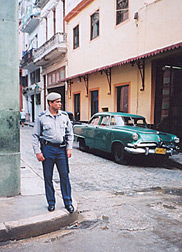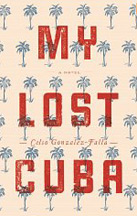 HAVANA, 2003
HAVANA, 2003
Author Celso Gonzalez-Falla must have felt pleasure in being able to report that one of Cuban dictator Fulgencio Batista's more brutal followers, one that took sadistic pleasure in maiming the innocent, had been caught by the invading rebel army and eventually shot by a firing squad. He leaves the reader with a small thought that justice prevailed but did it?
"I have not returned to Cuba, but I don't want to bore you with that," he tells the reader up front.
My Lost Cuba (East End Press) is more concerned with how the Batista regime was affecting the lives of its people than what Fidel Castro had planned for the nation. It is the mid 1950s and corruption is rampant, civil liberties are being dismantled.
"More than 50 years hve passed since the events in this book occurred. This is a story about the Cuba I knew, the island I feel in my bones and in my heart," writes Gonzalez-Falla in his introduction. While reminiscing about the way it was, he does suggest that he or his children may one day be able to visit.
One of Gonzalez-Falla's chief protagonists is named Mike Rodriguez, a post graduate business student in America who is summoned by the accountant of his father and grieving husband, Don Miguel to come home--home to a large ranch in the countryside suggestive of the wealth accumulated by "measure and prudence in all things," not to forget being in a position to buy up adjoining foreclosed sugar plantations and bribe the "Guardia Rural" to insure "peace and understanding." The not so permanent funk that the father is in has come about after the death of his cancer-ridden wife whom he finds as a devoted husband he can not live without..until meeting a younger attractive woman but that comes later.
While Mike is insistent that he must return to the states to finish his schooling, he is overcome by his devotion to his father and his father's need to step aside from the rigors of managing and maintaining the ranch.
This responsibility includes interaction with the ranch hands, one of whom Mike rescues from the ever-mounting sadism of Batista's Army Intelligency Force. Paulino, the son of a bodega owner, we are told is a well-read student and writer who finds himself caught up in anti-Batista politics. While he seems to be "safe" living and working at the ranch, a sufficiently long car ride from Havana, he knows he is no longer "free," but still has hopes that his circumstance is only a "short detour in life's journey."
Other characters that Gonzales-Falla introduces are in the same situation. Lack of education and kept economically dependent even though industrious, these workers almost appear as indentured servants polishing silver or tending to the ranch's prize livestock. Isolated, however, their lives are protected by the influence Don Miguel has with the authorities--his intelligence and wealth.
Love is not repressed on the island and the author shares its emotional ups and downs as he describes the significance of breeding or social status. Don Miguel's daughters are introduced as a sounding board for their father's behavior, his chance meeting with a younger woman.
In spite of the power of money, the idea that influential families should take a more active role in the political process in Cuba becomes the topic of a typical salon in Havana. We know the outcome--that this didn't occur.
"Revolutions have never created a viable society. New symbols, new icons and new gods will substitute for symbols that we destroy, and the new icons may be less attractive," is a warning that foreshadows what is to come.
The author provides the reader in an epilogue with what happens to his cast of characters after the Instituto Nacional de Reforma Agraria (responsible for land confiscation and management) is empowered by the Castro regime. You'll be happy to know that the author lets some of them make their way to the United States and become successful in our capitalistic society.
Gonzalez-Falla became involved in the counter-revolution against Castro, avoiding arrest by seeking political asylum at the Chilean Embassy in April of 1961. He came to Texas two months later. He is a member of the Texas Bar and a founding partner of Porter, Taylor and Gonzalez law firm in Corpus Christi. From 1997 to 2003 he was appointed by then Governor Bush as Texas Art Commissioner.Today he is president of Soncel Financial and holds office in various foundations, one of which assists artists, writers, musicians and intellectuals of Cuban decent living out of Cuba. My Lost Cuba is his first novel.

Title - My Lost Cuba
Author - Celso Gonzalez Falla
Publisher - East End Press (10/4/13)
pp.320/841 KB
$19.69/hard copy; $9.99/Kindle at Amazon.com
ISBN-10: 0988767325
ISBN-13: 978-0988767324
ASIN - 800FRVQMJA
Has life in Cuba changed? Here's what I discovered 10 years ago: My visit.
The National Trust for Historic Preservation recently sent an e-mail trying to entice me to visit Cuba once again, but the fumes of Havana from the old cars still inhibits my nostrils to smell the roses and the carefully chosen sites we could visit, a practice that no doubt remains today, continues to fog up the reality of the place.






Comments